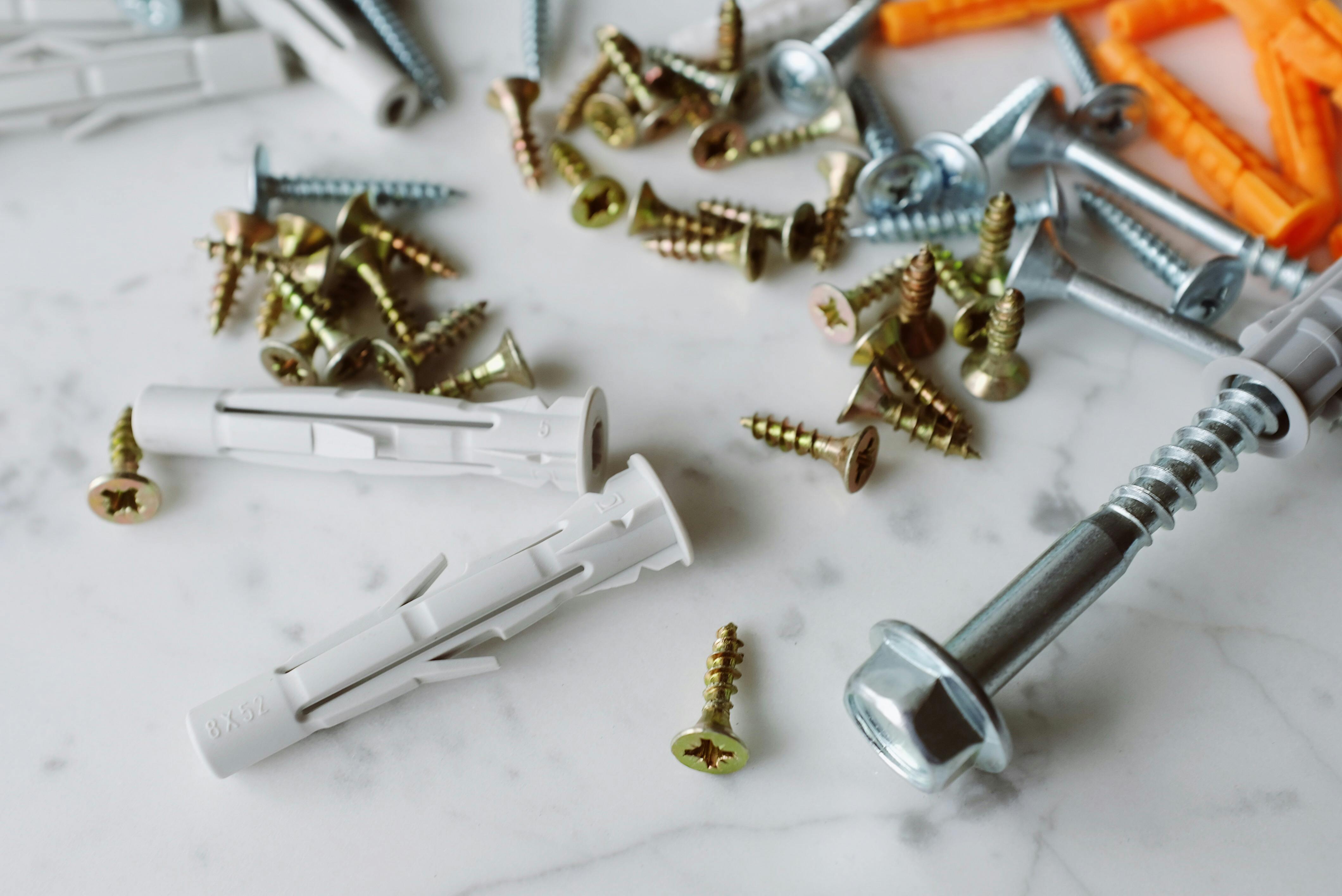Guide to Fasteners: Types, Uses, and Choosing the Right One
1. What Are Fasteners?
Fasteners are hardware devices that mechanically join or affix two or more objects. They are designed for permanent or temporary connections and come in a range of shapes, sizes, and materials, each suited for specific purposes. The effectiveness of a fastener depends on factors like the material, size, and the type of load it will bear.
2. Types of Fasteners
Fasteners come in a wide variety, but they are generally grouped into these major categories:
a. Screws
Screws are versatile fasteners that create strong, secure joints. They typically have a threaded shaft and require a screwdriver or drill for installation. Some common types include:
- Wood Screws: Used for wood applications with a smooth shank and coarse threads.
- Machine Screws: Used for metal or plastic and typically require pre-drilled holes.
- Self-Tapping Screws: Create their own threads in soft materials like wood or plastic.
b. Bolts and Nuts
Bolts are fasteners with an external thread that require a nut to secure them. They are commonly used in applications where high strength is needed. Common types include:
- Hex Bolts: Have hexagonal heads and are used in construction and machine assembly.
- Carriage Bolts: Feature a smooth, rounded head with a square neck to prevent rotation.
- Lag Bolts: Large wood screws often used for heavy lumber and are installed with a wrench.
c. Nails
Nails are fasteners driven into materials like wood without threading. They are quick and easy to install, but they generally provide less strength than screws or bolts.
- Common Nails: Ideal for structural projects like framing.
- Finishing Nails: Used for trim and other decorative wood projects.
- Concrete Nails: Hardened nails for concrete or masonry applications.
d. Anchors
Anchors are fasteners used to secure objects to materials that don’t naturally allow fastener attachment, such as drywall or masonry.
- Expansion Anchors: Expand inside the material to create a strong hold, common in concrete applications.
- Toggle Bolts: Feature spring-loaded wings that open inside the wall, providing a strong hold for light to medium loads.
- Plastic Anchors: Lightweight anchors for use with drywall and hollow walls.
e. Washers
Washers are used with bolts and screws to distribute the load, reduce friction, and prevent loosening. They are available in various types, such as flat washers, lock washers, and spring washers.
f. Rivets
Rivets are permanent fasteners installed by deforming one end. Commonly used in metalworking, they are known for their durability and strength.
- Blind Rivets: Ideal for applications where only one side of the workpiece is accessible.
- Solid Rivets: Require access to both sides of the materials and are used in aircraft construction and structural steelwork.
g. Clips and Clamps
Clips and clamps are fasteners that hold objects in place without permanent attachment, commonly used in automotive and HVAC industries.
3. Choosing the Right Material
The material of the fastener is a key consideration for performance, as it affects strength, corrosion resistance, and durability.
- Steel: Most common and suitable for general applications. Stainless steel offers better corrosion resistance.
- Aluminum: Lightweight and corrosion-resistant, ideal for lightweight applications.
- Brass: Corrosion-resistant and aesthetically pleasing, often used in marine and decorative applications.
- Titanium: Extremely strong and corrosion-resistant, but expensive; often used in aerospace.
4. Selecting the Right Fastener for Your Application
When choosing a fastener, consider the following factors:
- Load Requirements: Evaluate the weight and load conditions the fastener will bear. High-load applications often require bolts, while lightweight applications may only need nails or small screws.
- Material Compatibility: Match the fastener material with the materials being joined to avoid galvanic corrosion.
- Environmental Conditions: If the fastener will be exposed to moisture or chemicals, choose corrosion-resistant options like stainless steel or brass.
- Ease of Installation: Some fasteners require specialized tools (e.g., rivets), while others like screws are easier to install with common tools.
5. Conclusion
Fasteners may be small, but their impact is huge—they’re the backbone of countless applications. By choosing the right fastener type and material for your project, you ensure safety, durability, and functionality. Whether you’re assembling furniture, constructing a building, or working on a mechanical project, understanding fasteners helps make informed choices that lead to successful, long-lasting results.
6. Common Questions on Fasteners
Q: What’s the difference between bolts and screws?
A: Bolts generally require nuts and are used for applications needing high tensile strength. Screws, on the other hand, are often threaded directly into the material without a nut.
Q: Why are washers important?
A: Washers distribute the load and reduce friction, which prevents the fastener from loosening over time.
Q: How do I choose between stainless steel and galvanized fasteners?
A: Stainless steel is generally better for corrosion resistance, especially in wet environments, while galvanized fasteners are cheaper and suitable for many outdoor applications.
By understanding and selecting the right fasteners, you can create stronger, safer, and more durable assemblies, making a difference in both small-scale DIY projects and large industrial applications.

